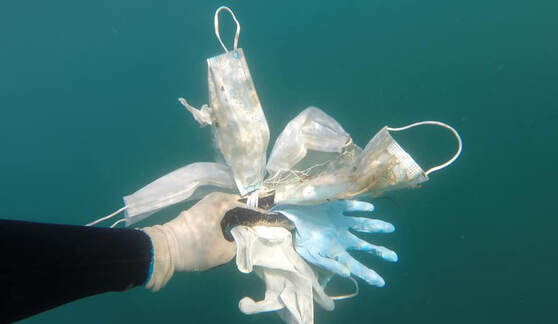Is Plant-based PPE the vaccine to COVID-19 litter?
non-profit Opération Mer Propre, shared divers images of gloves and face-masks during their litter-picks along the Cote d’Azure demonstrating that they had made their way to the sea.
Whilst many people applaud these products as a win against plastic pollution, however we are more sceptical. Materials using the terms biodegradable, compostable or plant-based, can sound a better option to their villainized fossil-fuel plastic cousin, but we always want to know these things?
What happens if they become litter?
- Compostable require temperatures of 60 degrees for 90 days
- Home-compostable requires 20-30 degrees for between 28 days to 26 weeks.
Of course, city streets, the countryside, local rivers, sea do not currently reach these temperatures, which means these items will still remain litter. And even if they do degrade after 26 weeks naturally that is still 6 months of littering time! You can read more on the different
bio-plastic classifications here.
Which compost facilities will actually accept them?
In order for these new plant-based visors to get composted, Terracycle, a company that provides takeback schemes for hard-to-recycle plastics is offering a takeback scheme for the cellulose ‘home-compostable’ PPE visors, that hit the market recently because these can’t simply go into the existing food composting system because the reality is most processors (anaerobic digestors) don’t actually accept compostable or home compostable plastics. For more on the different types of bio-plastics and how they should be processed read our blog.
So what is the answer for PPE?
Well if these compostable materials go in your general waste bin, they will not biodegrade in landfill because nothing degrades in landfill, and in the main your general waste will be going for waste-to-energy incineration.
But surely bio-based plastics are better than fossil-based plastics?
Questions to ask when you see a bio-based material?
- Is the recycling or composting process practically available in the location this item will end up?
- Can my waste contractor process it in the suggested way?
- Does the manufacturer offer a take-back scheme
- Will it actually end up in general waste (which means it is probably going for waste-to-energy incineration)?
- If it becomes litter, can it actually degrade? (if something can hold a fizzy drink in it, it is unlikely to dissolve when it lands on a grass field)
Want all the insights into Waste and recycling, watch the Waste 101 recording



10% of all online courses go to grassroots charities.
20% of all consultancy and bespoke workshops go for rewilding.
50 free places are awarded to campaigners from underrepresented communities each year.



